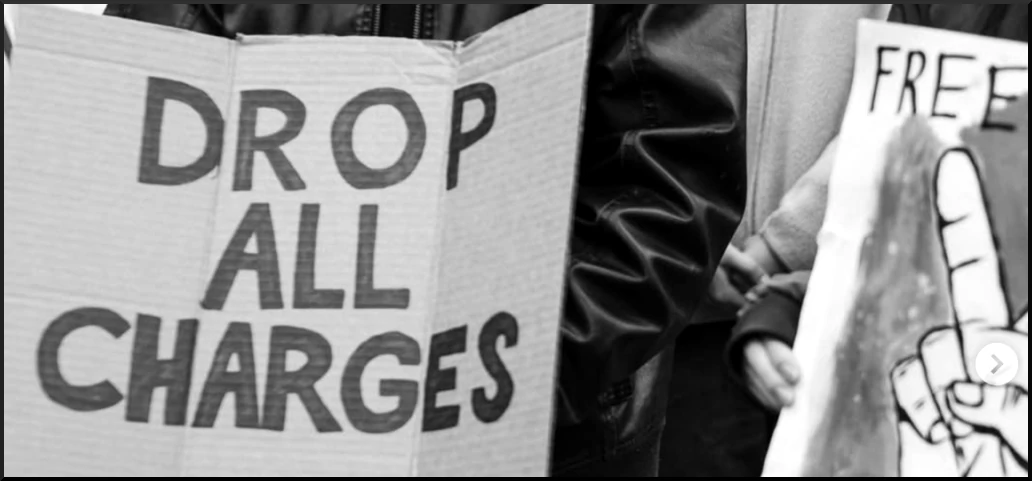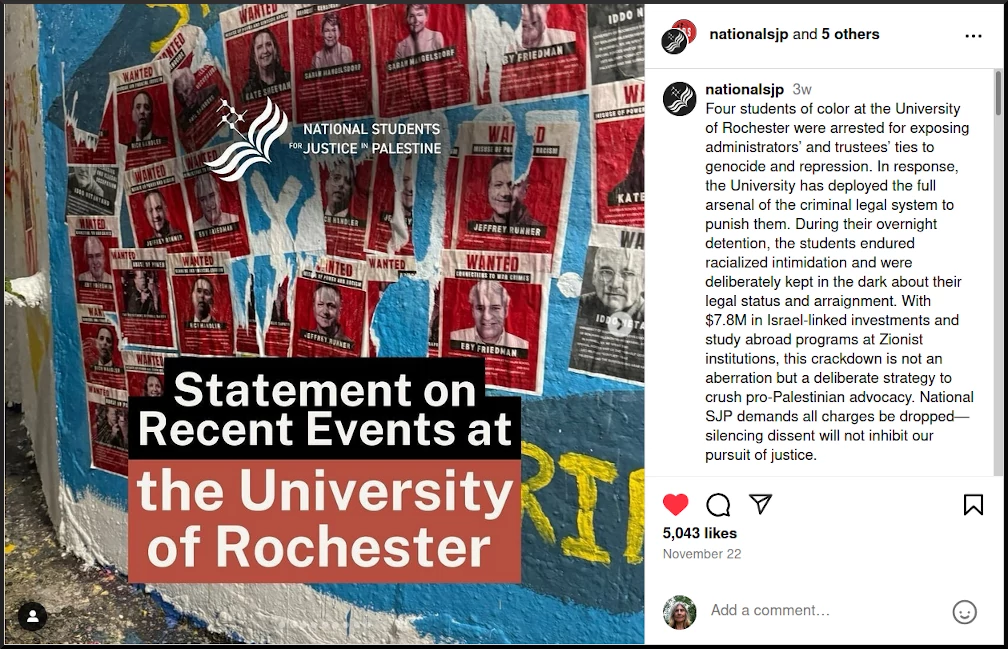by Michael Arria, published on Mondoweiss, November 14, 2024
Four students at the University of Rochester are facing up to seven years in jail for putting up posters around campus accusing a small number of faculty members of enabling the genocide in Gaza.
Last month four students at the University of Rochester were charged with second-degree criminal mischief for their connection to “Wanted” posters that were put up around campus.
The posters accused a small number of faculty members of enabling genocide and supporting the displacement of Palestinians in Gaza. Not all the faculty members identified are Jewish, but the university immediately sent out emails tagging the action as antisemitic. Pro-Israel campus groups condemned the posters, including the school’s Hillel chapter which claimed they “disproportionately singled out Jewish faculty and staff and used language that spreads harmful, antisemitic ideas about Jewish people.”
The charges do not mention the content of the posters. The students were arrested for alleged damage to campus walls, but if convicted they could face up to seven years in jail and a fine of up to $5,000.
Jewish Voice for Peace (JVP) is circulating a petition calling for the charges to be dropped.
“Repression of those fighting for Palestinian liberation is only increasing, and students are among the most vulnerable members of our movement,” it reads. “That’s why it’s critical that we act to protect these students, and refuse a precedent that mischaracterizes our movement, represses free speech, and shuts down demands for divestment from Israeli genocide.”
Mondoweiss U.S. correspondent Michael Arria spoke with JVP University of Rochester member Faye Stephenson and University of Rochester Students for Justice in Palestine (SJP) member Carlos Portilla about the charges, the university response, and the climate on campus.
Mondoweiss: Can you explain these wanted posters and who they referenced?
Stephenson: Neither of us were involved with putting up the posters and we don’t know the intent of the people beyond the fact that we are also members of the Palestinian movement, but the best reporting on the story is by the school’s Campus Times paper. Basically there are various members of faculty, some Jewish, some not, and the posters basically detailed their academic and economic ties to Israeli apartheid and the ongoing genocide. They were displayed around the school.
What was the administration’s reaction to the posters and how was it covered by the media?
Stephenson: Immediately after the posters went up, we received an email from administration that deemed it as an antisemitic hate crime. Nothing about the context of the posters was mentioned. They framed it as if all the people in the posters were Jewish and they were targeted for being Jewish. There was no other information about what was on the posters. They were actively asking for no other information be spread which of course led to the spread of disinformation because people had no idea what was on these posters.
Swiftly deeming it antisemitic led to big news stories, which did the exact same thing. Not knowing what was on the posters, not publishing full information about the posters.
Then individual students are targeted by the DA.
Portilla: Like Faye mentioned, the email was sent the day after the posters went up. That was a Monday. Throughout that week two more emails were sent. One was from the Chief of Public Safety and another from [university president] Sarah Mangelsdorf, herself.
They were just persistently calling the posters antisemitic and then the arrests happened the following Tuesday and they sent out an email basically saying these students had been charged with criminal mischief in the second degree, but that the crime doesn’t fit the qualifications of a hate crime.
Stephenson: I should specify that they’re being charged with felony criminal mischief and they have stuck by the fact that they claim the posters are antisemitic. They just state that they do not meet the threshold of being charged as a hate crime. So they’re not entirely backing up from their claims of antisemitism.
Four students have been suspended and banned from campus for allegedly putting up the posters. Originally they said five students had been singled out, but they arrested four. They’re facing charges in the coming months.
Portilla: I also just wanted to add to that, in addition to being banned and suspended, they were also like essentially evicted from student housing. They got out of their jail cells after the arraignment and their locks had been changed.
Can you talk about the response to the arrests on campus? I know there’s a petition circulating to have the charges dropped.
Stephenson: At JVP we’ve been quick in trying to combat the narrative about antisemitism and calling on our university to be transparent about how they’re coming to these conclusions of antisemitism. The school has frequently avoided questions on how they define antisemitism and what their process is for determining whether something is antisemitic so we’re calling for transparency there.
Additionally, we have petitions for dropping the charges, repealing the student suspensions and we’ve organized protests against the charges alongside SJP.
Portilla: On the SJP side, we’ve been focusing on the incident and bias reports from students about various incidents on campus that the university has failed to address.
They’re constantly and continuously failing to address these incident bias reports, but acted so quickly on this. The response from the university to the posters was completely disproportionate to past responses like the anti-Black vandalism at Simon Business School, swastikas that were drawn on campus, and other examples that were recently cited in a Student Government Association resolution.
Can you talk about the climate on campus in terms of Palestine activism since October 7?
Stephenson: As an anti-Zionist Jewish person on campus, I would say we have a pretty high Jewish population, like disproportionately high compared to a lot of other universities, and there’s been a lot of messaging from administration presenting an untruthful narrative about all Jewish people supporting Israel. The messaging has also been that silencing Palestinian groups is for the good of Jewish people on campus and helps ensure Jewish safety.
We’ve seen a lot more that messaging appearing now that they’ve brought charges against these students, but we’ve seen it for the entire year.
I do think we’ve gotten a lot more leeway than a lot of other campuses with being able to protest, but this semester we saw the school release new protest policies trying to limit our actions.
Portilla: I think that hits the mark. The only thing I would add is that it’s been hard to get student support on campus because of all the university’s new policies, especially after the encampment. They’ve really cracked down on what students can and can’t do and there’s just a general fear of having to face conduct proceedings. Especially now after the arrests, people are really, really hesitant to do anything. So that is a challenge on campus right now.
*Featured Image: Photo from University of Rochester JVP Instagram (cropped)
Michael Arria is Mondoweiss’ U.S. correspondent. His work has appeared in In These Times, The Appeal, and Truthout. He is the author of Medium Blue: The Politics of MSNBC. Follow him on x at @michaelarria..

